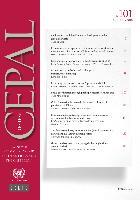Raúl Prebisch and the challenges of development of the XXI century
Stages of thinking
Prebisch's six intensely active decades revealed a personality who had built up a huge reservoir of knowledge and experience. During this period, his thinking underwent changes, shifts, innovations and breaks, due to a natural process of maturation, changes in the general historical background and also changes in the posts that he held.
Six separate phases may be indentified in his career. The last five are based on an autobiographical article entitled “Five Stages of My Thinking on Development”, which he wrote in 1984, two years before his death. These were preceded by the first phase, which covered the period 1919-1943, when he worked in Argentina as a teacher, as adviser to various public and corporate agencies and as a civil servant, holding important positions in particular the posts of Under-Secretary for Finance and Managing Director of the Central Bank of Argentina.
The second phase (1944-1949) coincided with Prebisch's work as adviser to different Latin American Governments on central bank and institution-building policy. During this period, Prebisch came to understand his region and started to build the concept of Latin America.
The third phase is probably the most remarkable, since during this period, he helped to create ECLAC and to build it into an intellectual and technical powerhouse, with a major impact on the policies of the continent. This phase started in the late 1940s and lasted throughout the 1950s.
The fourth phase is a short one and will be combined with the third in our presentation. It runs from the late 1950s to the early 1960s and is marked by a revision of some of his earlier theories and greater priority to regional integration and Latin America's domestic problems.
The fifth phase is marked by a leap to a global perspective, with his appointment at the head of UNCTAD, the organization, which resulted, to a a great extent, from his experience at ECLAC and where the first attempts were made to forge agreements between the developing countries as a whole.
The final phase encompasses Prebisch's work on the CEPAL Review, once he had been relieved of his administrative tasks; it is marked by a return to deeper theoretical analyses, based on the critical centre/periphery system.
Interviews
Entrevista a Osvaldo Sunkel: Aspectos centrales del pensamiento de Prebisch (2013 - 2:19)
Entrevista a Ricardo Bielschowsky: Continuidad y cambio del pensamiento de la CEPAL (2013 - 1:34)
Related documents
-
 Prebisch: the continuing validity of his basic ideas
by
Publication Date: 2001-12Revista de la CEPAL No.75 . p. 41-52 (LC/G.2150-P)
Prebisch: the continuing validity of his basic ideas
by
Publication Date: 2001-12Revista de la CEPAL No.75 . p. 41-52 (LC/G.2150-P)

